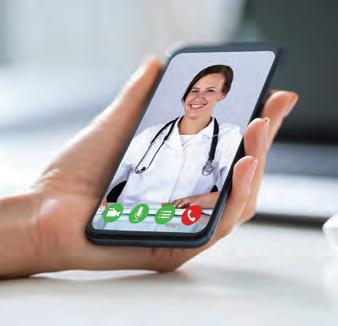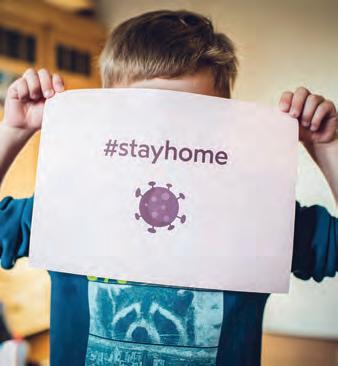
6 minute read
Telehealth on the Rise
providers also understand that like other digital communications [such as video calling and social media] telemedicine and digital health are becoming essential tools of healthcare delivery.” Many healthcare providers are finding that telemedicine is a great tool to supplement in-person visits and as a means to check in with patients and track their progress. For certain situations, in-person visits are not needed and a virtual appointment saves time for the patient and doctor. More healthcare providers have been receptive to using telemedicine as its benefits are becoming more apparent. “There had been hesitancy in the past, however it is becoming quite popular with both physicians and patients alike,” says Dr. Ahmed. “Improved access and convenience with flexibility are the key factors of this drive, and now with reimbursements, it would be adopted more and more.”
Amidst the current global pandemic, many hospitals and medical practices have begun using telemedicine to offer their patients virtual appointments in order to stop the spread of COVID-19. “Social distancing is the key preventive strategy to flatten the curve and as patients are being advised to stay at home except for emergency cases, however it has also posed unique challenges to the healthcare systems as most of the outpatient clinics have closed down, at least partially, to avoid risks of exposure to healthcare workers and other patients, yet this also has put patients with chronic care disease at risk of not having close follow-up,” says Dr. Ahmed. “Telemedicine has proven to be very effective in providing continuation of care to such patients as well as COVID-19 positive patients who are not very symptomatic and have been advised to stay at home. Telemedicine is also proving to be very beneficial in inpatient settings to avoid exposure to healthcare providers. Moreover, telemedicine is also allowing families to be involved in the care of their loved ones despite being away from them physically.”
Advertisement
Telehealth Legislation in Florida
In 2019, the Florida legislature passed new telehealth legislation that establishes standards of practice for telehealth services. House Bill 23 was signed by the governor on June 25, 2019 and became effective on July 1, 2019. According to the bill, a telehealth provider in Florida is anyone delivering healthcare and other related services using telecommunication technology. Telehealth services can include the evaluation, diagnosis, treatment, and monitoring of patients who need care. The bill also states that out-of-state telehealth providers need to be licensed by another state, register with the Florida Department of Health, maintain professional liability coverage, and pay an initial registration fee of $150. The bill also lays out certain restrictions for telehealth providers. Telehealth providers are prohibited from opening an office or providing in-person services. Telehealth providers cannot use telehealth to prescribe controlled substances, except for treatment of a psychiatric disorder, as part of an inpatient treatment at a hospital licensed under Chapter 395 Florida Statutes, or for a patient receiving treatment in a hospice or nursing home. With this new telehealth legislation in Florida, access to healthcare for those living in rural or urban areas where physician availability is problematic will significantly increase. On January 1, 2020, the bill created a new section, which states that a contract between a health insurer providing coverage through an individual or group insurance policy as well as a telehealth provider must be voluntary. This includes establishing acceptable payment rates or payment plans for services that are provided by use of telehealth. The telehealth provider must also initial contracts that recognize payment for services provided by telehealth versus services without the use of telehealth.



The COVID-19 Pandemic
Sparking a global pandemic like we have never seen before, coronavirus 2019 (COVID-19) is a new strain of coronavirus that belongs to the virus family that causes the common cold and upper respiratory infections. According to the World Health Organization, most of the people who are infected with COVID-19 will experience mild to moderate respiratory illness and recover without needing special treatment. However, older people and those with underlying medical conditions such as cardiovascular disease, diabetes, chronic respiratory disease, and cancer are more likely to become seriously ill.
Government Orders and Mandates
In response to the outbreak of COVID, the City of Gainesville’s, Mayor Laura Poe, declared a State of Emergency in the City of Gainesville on Monday, March 16. Her hope was that this order could help the city control and fight the spread of COVID-19 by encouraging citizens to stay home unless necessary to be out and about. According to Florida Governor Ron DeSantis’ order, Florida residents should only leave their homes to obtain or provide essential services or conduct essential activities,
such as grocery shopping. When going outside, Florida residents have been advised to practice social distancing guidelines, which include remaining at least six feet away from other people. Gov. DeSantis also prohibited nonemergency procedures in order to preserve hospital resources and supplies amidst the coronavirus outbreak, which was implemented on March 20, 2020. On April 29, 2020, Gov. DeSantis unveiled his “Safe. Smart. Step-by-Step.” initiative to begin reopening the state. The initiative allows hospitals and surgical centers to restart elective procedures if they have enough medical supplies.
How North Central Florida Hospitals Have Responded
Hospitals and medical centers in North Central Florida and the Gainesville area have taken a number extraordinary measures to fight COVID-19. Due to COVID-19, many people have found themselves unemployed, losing health insurance. To help remedy this, Ocala Health has started a free insurance hotline to assist both families and individuals in finding temporary healthcare coverage during unemployment. The hotline is available Monday through Friday and a live person will assist the caller. UF Health began expansion of COVID-19 testing for City of Gainesville employees with results available within 24 to 48 hours. While this test isn’t approved by the U.S. Food and Drug Administration, the test will still give patients some answers. The tests are part of a research project by the UF Emerging Pathogens Institute and developed by UF Health researchers. If a patient does test positive, they will be referred to their appropriate healthcare professional. AdventHealth’s Centra Care began offering rapid testing for COVID-19 in the Gainesville area. The tests detect antigens, which are a specific protein found on the surface of the virus. These tests can provide results in approximately 15 minutes. Whether positive or negative, the rapid testing gives people the ability to seek treatment and take proper precautions for themselves and others. As of September 2020, the goal was to conduct 20,000 tests a week. North Florida Medical Center has joined a national study to determine whether it is best to use plasma from previous COVID-19 patients to treat currently infected patients. Research has found that using plasma from patients who have recovered from COVID-19 can be beneficial. The proteins found in the plasma can help attack the virus in infected individuals. The study asks that people who have previously tested positive go to a local American Red Cross location to donate their plasma. During these difficult and unprecedented times, hospitals, health systems and all our valuable healthcare providers are going above and beyond to keep our community healthy and safe. They are out on the front lines risking their own health to care for those who are sick, and with their dedication and hard work, life will return to normal.



The Future
December 14, 2020 marked the day that the first shipments of the recently authorized COVID vaccine manufactured by Pfizer were received by health care systems across the country. Gov. DeSantis stated that in Florida 100,000 doses of the vaccine will be used on front line health care workers. The next 60,000 doses will go to CVS and Walgreens to be administered at long-term care facilities. Gov. DeSantis expects the vaccine to be available to the general Florida population at some point in February 2021.







